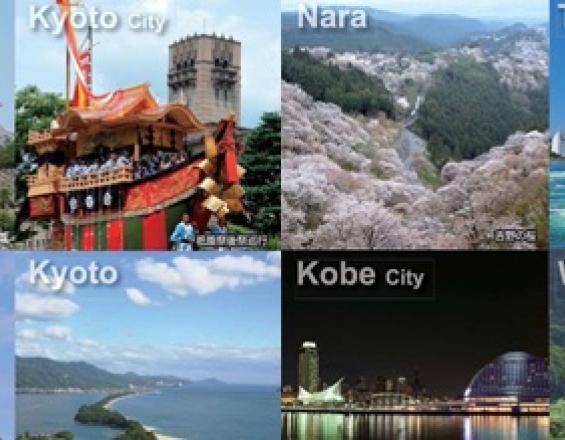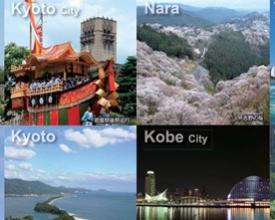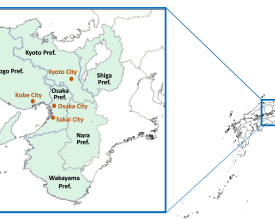
Empowering Local Authorities through Intergovernmental Collaborations

Kansai is located in the southern-central part of Japan's main island and forms the second largest economic center of the country. The Union of Kansai Governments (UKG), an intergovernmental or regional government body, was established to enhance the regional autonomy, seeking ways to reform the existing local government system and propel administrative decentralization in the region. UKG, comprised of eight prefectural governments and four ordinance-designated city governments, forms the country’s largest agglomeration in terms of population, territorial size, and gross domestic product.
Context
Challenges addressed
Japanese administrative systems are quite centralized and standardized by national government in practice. Japan’s local governments tend to rely heavily on the national government’s direct subsidies and/or large-scale capital projects, and therefore fiscal decentralization is also an issue to ensure local entities take their own initiatives. This centralized governance structure has long been controversial from the standpoints of local autonomy and economic growth. Decentralization has also been discussed in the context of the issue of excessive concentration of financial and human resources and administrative power in the Tokyo Metropolitan Region (TMR), which would lose economic competitiveness of local cities on the domestic and international market and increase national security risks if there was an unexpected breakdown in capital functions.
Location
Process
Summary of the process
The entire area of Kansai constitutes one of the largest economic units in the world. To accelerate growth as a mega-regional economic body that also brings provision of better public services, local governments have been taking progressive approaches to expand their autonomy and increase their regional competitiveness. UKG challenged this by two approaches of i) intergovernmental collaboration for issues beyond administrative boundaries, and ii) institutional autonomy for effective and efficient administration.
Building Blocks
Intergovernmental Collaboration for Issues Beyond Administrative Boundaries
UKG is responsible for policymaking and implementation across jurisdictions of each member government in seven fields, namely disaster prevention; tourism cultural and sports promotion; industrial promotion; medical care; environmental conservation; qualification tests and licensing; and training for officials. This unitary approach enables the member entities to address economic, social, and environmental challenges more efficiently and effectively through development and implementation of regional-wide policies, such as public infrastructure projects and public service programs, while reflecting their local contexts.
Enabling factors
-
Unitary approach of UKG to manage regional infrastructure
-
Local Autonomy Act Amendment in 1994 and the effectiveness of the Omnibus Decentralization Act in 2000 (roles played by the national and local governments largely changed with local authorities becoming more autonomous than hierarchical, which also meant more opportunities for decentralized development under the aegis and guidance of the central government)
-
Spontaneous leadership from cities within the Kansai Region
Lesson learned
The national government, in general, plays a central role in developing and managing large-scale infrastructure, such as rivers works, arterial roads, or national parks. Although the delivery of contemporary infrastructure increasingly requires localized knowledge, business partnerships, and social involvement, there has traditionally been a lack of institutional capacity building to cope with region-wide matters between national-local entities. An intergovernmental body beyond administrative boundaries like UKG is set to become more important to ensure multi-stakeholder participation in planning and managing complex and expensive projects on the basis of locally-rooted research, and consensus-based decision-making.
Institutional Autonomy for More Efficient, More Effective Administration
UKG has been given several special autonomous rights in public administration delegated by its members under the Local Autonomy Act. In addition to promoting regional-wide administrative works mentioned in the first Building Block, it partially takes over the role of the national administration. For policymaking on important issues, UKG constitutes a special coordination body composed of governors and mayors of UKG members. Each member is appointed as a commissioner responsible for decision-making and implementation for each administrative field/sub-field of UKG, and field offices are set up under each responsible member governments. Furthermore, councils can be set up to discuss important issues of the region with participation of local stakeholders. This governance system ensures that UKG represents the regional voices. Nevertheless, the finance of the Union entirely depends on mandatory contributions from the member governments and subsidies from the national government as the right of taxation is not included in the given rights.
Enabling factors
- Several special autonomous rights in public administration delegated by the members under the Local Autonomy Act
- Establishing a governance system that ensures that UKG represents the regional voices for policymaking on important issues
Lesson learned
An intergovernmental organization can administrate cross-jurisdictional issues more effectively and efficiently than the national government when the member governments in the system reflect regional needs and make good use of the local knowledge and network.
Impacts
Economic Impact: By integrating administrative offices in several fields (e.g. medical care, qualification/licensing/training, environmental conservation, disaster prevention), UKG can provide public services in a more efficient and effective manner over the region (e.g. sharing helicopters for emergency medical service). UKG also promotes technical exchange among businesses and research institutes of local governments through its website and removes any additional fees when a company uses the technology developed by an institute located in other prefectures/ municipalities as a part of technical support to small and medium-sized companies.
Social Impact: The region-wide administrative collaboration improves the performance of local public services such as emergency medical services and regional disaster risk reduction. UKG also contributed to united actions to support recovery and reconstruction to other regions that worked very effectively by allocating specific roles to its members.
Environmental Impact: UKG developed a comprehensive plan for environmental protection activities in Kansai. This intergovernmental coordination is supposed to embody more effective environmental resource management in an integrated manner. The union launched several new programs to promote environmental conservation (e.g. energy-saving, electric vehicles, reduction of GHG emission).
Beneficiaries
- Member governments of UKG
- Residents of Kansai Region
- Private entities in Kansai Region


